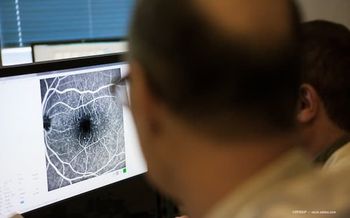
ARVO 2025: Early intervention is crucial for patients with sickle cell retinopathy
Jennifer Lim, MD, FARVO, FASRS, discusses her ARVO presentation on sickle cell retinopathy, highlighting improvements in retinal surgery techniques and instrumentation.
Joining the Eye Care Network in Salt Lake City, Jennifer Lim, MD, FARVO, FASRS, discussed her Association for Research in Vision and Ophthalmology (ARVO) presentation on sickle cell retinopathy. "We know that sickle cell retinopathy is fraught with complications when proliferative sickle cell stages develop, such as vitreous hemorrhage or retinal detachment," she said. "Unfortunately, when we do surgery for that frequently, we can get complications which include high rates of retinal tears as well as recurrent retinal detachments."
Fortunately, improvements in retinal surgery techniques and instrumentation have increased the fixability of retinal detachments: success rates for these repairs have increased from 50% to nearly all cases.
"We performed a retrospective study where we reviewed all patients with sickle cell retinopathy in the electronic health record, and we found that there were approximately 25 patients of 208 who had surgical indications," she said. "However, we excluded some patients who did not have at least 6 months of follow up or had some missing data. We, therefore, were left with 21 patients, which included 23 eyes."
The vast majority of these patients had either hemoglobin SC or hemoglobin SS subtypes of sickle cell disease. "We found that for patients who had non retinal detachment indications for surgery, that the vast majority of these patients had improvements in vision and had good anatomic outcomes for the patients who had non retinal detachment indications," said Dr. Lim, citing that 90% of patients had significant improvements in visual acuity outcomes. "For the patients who had retinal detachment indications, 13 eyes, the vast majority of these patients also had improved or stable visual acuity outcomes," she added.
Lim also emphasized the importance of early intervention with laser treatment to prevent vision loss and stressed the need for regular screening. To hear more about the study findings, and the clinical implications, watch the full video.
Newsletter
Keep your retina practice on the forefront—subscribe for expert analysis and emerging trends in retinal disease management.



























